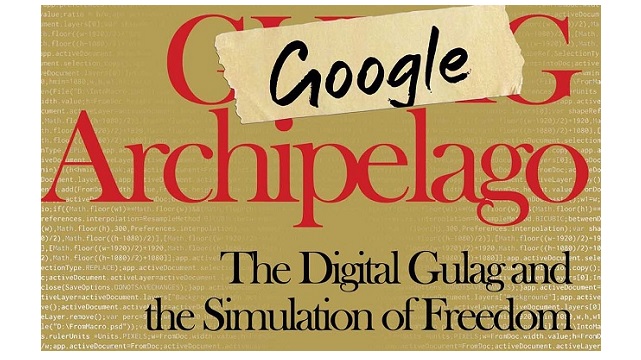Book ‘Google Archipelago’ Exposes the growing threat of ‘Big Digital’ and ‘Corporate Marxism’

“The beauty of the Internet is that it connects people. The value is in the other people. If we start to believe that the Internet itself is an entity that has something to say, we’re devaluing those people and making ourselves into idiots.” – Jaron Lanier, “Digital Maoism: The Hazards of the New Online Collectivism.”
”[Social media’s] suppression of internet content on ideological grounds threatens the future of America more than any external enemy. In fact, never in American history has there been as strong a threat to freedom of speech as there is today.” – Dennis Prager testimony before the U.S. Senate.
Former New York University (NYU) professor Michael Rectenwald, author of nine books including Springtime for Snowflakes: ‘Social Justice’ and Its Postmodern Parentage, has published his most recent analysis of our society in a book titled Google Archipelago: The Digital Gulag and the Simulation of Freedom.
Michael Rectenwald was a professor at NYU from 2008 to 2019. He is a pundit and champion of free speech against all forms of authoritarianism and totalitarianism, including socialism-communism, “social justice,” fascism, and Political Correctness. He pulls no punches in his critique of big digital and corporate Marxism in Google Archipelago.
Professor Rectenwald writes:
Leftist authoritarianism, or authoritarian leftism, is the operation ethos of the Google Archipelago.
What is the Google Archipelago?
The title of Professor Rectenwald’s book is a parody of Russian novelist, historian, winner of the Nobel Prize, and prisoner of the former Soviet Union Aleksandr Solzhenitsyn’s 1973 book Gulag Archipelago.
Professor Rectenwald, like Solzhenitsyn, is an outspoken critic of Communism and is helping raise awareness of the dual threats of the big digital and corporate Marxism systems.
Systems not unlike the old Gulag labor camps in the former Soviet Union, but with a twist.
In 1945 Aleksandr Solzhenitsyn was arrested for criticizing Stalin in private correspondence and sentenced to an eight-year term in a labour camp (gulag), to be followed by permanent internal exile. The Gulag was a system of forced labor camps established during Joseph Stalin’s long reign as dictator of the Soviet Union. The word “Gulag” is an acronym for Glavnoe Upravlenie Lagerei, or Main Camp Administration. The notorious prisons, which incarcerated about 18 million people throughout their history, operated from the 1920s until shortly after Stalin’s death in 1953. At its height, the Gulag network included hundreds of labor camps that held anywhere from 2,000 to 10,000 people each. Conditions at the Gulag were brutal: Prisoners could be required to work up to 14 hours a day, often in extreme weather. Many died of starvation, disease or exhaustion—others were simply executed.
The atrocities of the Gulag system have had a long-lasting impact that still permeates Russian society today.
Today’s Google Archipelago mirrors the Soviet Gulag but without the torture, starvation, disease. The new Google Archipelago is still a prison camp but one of our own making. Every user of big digital and those who work for and with the corporate Marxists are prisoners in a gulag of their own making. The potential number of people (prisoners) in the Google Archipelago is in the tens of billions.
The atrocities of the Google Archipelago can have a long-lasting impact that permeates every aspect of American society today, tomorrow and for decades to come, unless exposed and stopped.
Professor Rectenwald notes:
[T]he goliaths of the Google Archipelago justify increasingly liberal politics and procedures, an authoritarianism rampant within corporate cultures and coexistence with the Google Archipelago at large. The political culture of the ‘wokeforces’ in the ‘wokeplaces’ of Facebook, Goggle, Twitter and elsewhere metastasize to become the character of cyberspace.
[ … ]
The inward-facing wokeplace resembles a high-tech Red Guard engagement in digital struggle sessions reminiscent of the Maoist Cultural Revolution (1966-1976).
Rectenwald warns, “If not a perfervid, cultish social-justice or woke activist, or at least an occasional virtue signaler of the ‘correct’ positions, one’s individual membership in one or more subordinated category may be rendered inert.”
For those who have been placed in Facebook jail, banned from posting on YouTube or deplatformed by Twitter it is understandable why everyone must wake up to the dangers of corporate Marxism.
Conclusion
Michael Rectenwald‘s book is a must read if you want to understand who is controlling your data and thereby controlling your life. Rectenwald writes:
As the history of the twentieth century vividly illustrates, when Marxism is ascendant, the ‘wrong’ have no rights, and the number of the wrong multiplies by the day. The evidence is in: the digital gulag is under construction.
Question: Do you believe that your cell phone knows more about you than your spouse or significant other?
If your answer is YES then you are already a PRISONER of the “digital gulag.”
Now you hopefully have come to realize it.
© All rights reserved.
RELATED ARTICLES:
The Role of ‘Big Data and Big Brother’
Mark Zuckerberg Leans on Free Speech While Defending Facebook’s Ad Policies
The Totalitarian American Left


Leave a Reply
Want to join the discussion?Feel free to contribute!